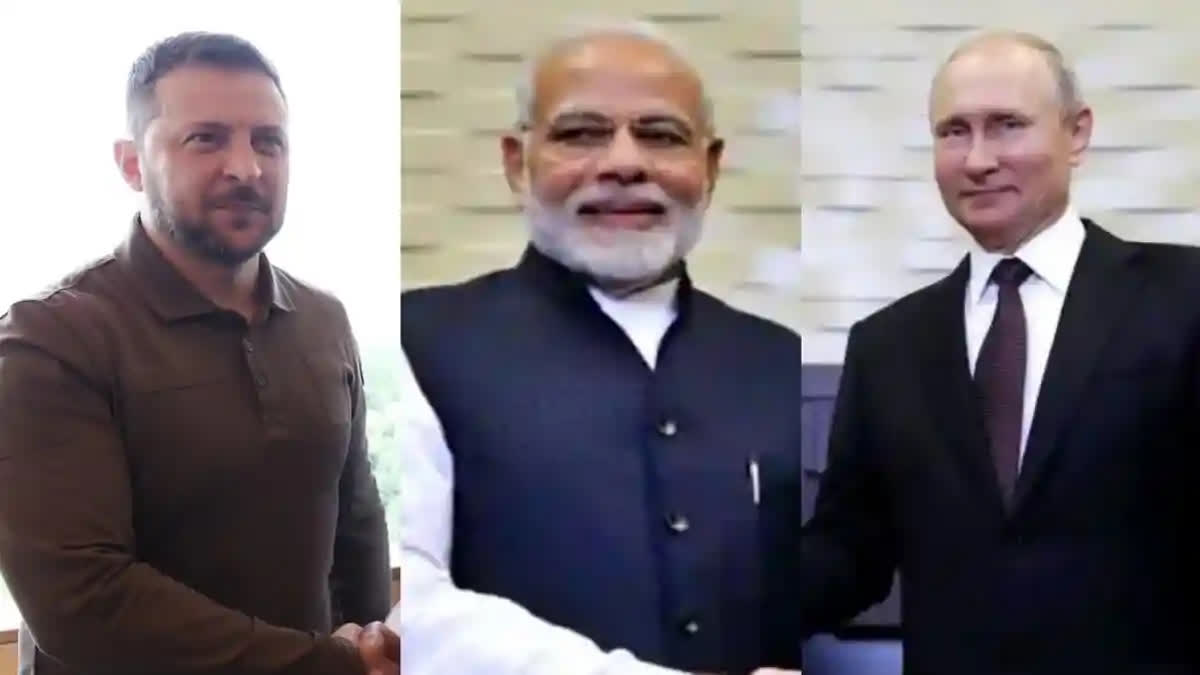New Delhi: India's unique position on the war in Ukraine and balanced approach so far could see it emerge as a key mediator. This was indeed reflected by the fact that Ukrainian Prez Zelensky is keen to see New Delhi attend the inaugural peace summit, which is currently being prepared in Switzerland. The summit is expected to take place in the coming months.
Prime Minister Narendra Modi's recent telephonic conversations with both Russian President Vladimir Putin and Ukrainian President Volodymyr Zelensky, have raised speculation of a possible attempt by India to mediate and negotiate a peaceful resolution to the ongoing Russia-Ukraine conflict.
ETV Bharat spoke to Harsh V Pant, Vice-President for Studies at the Observer Research Foundation, New Delhi, to get a clear idea as to how significant is the summit and what India's role is in the light of the conflict. He said," The peace summit in Switzerland is going to be significant because there is a drive for peace that is quite evident now. There is war fatigue- Ukraine is facing the challenge of declining support in Western capitals for this war and Russia too is undergoing tremendous stress because of the conflict.
Pant opined that there is a possibility that something might emerge at the summit, although there are questions about whether Russia would attend it or not.
"The inaugural peace summit is going to be the first big push towards some kind of negotiating settlement on this conflict. And now it is widely recognized that India is a key interlocutor today in the world. It will be very difficult to give the summit credibility without New Delhi's participation", said Pant.
"India being one of the few countries that have channels of communication open to both sides is a reflection and the fact that India can talk to both Russian and Ukrainian President on the same day, also underscores how important India's role might be in resolving the conflict", he told ETV Bharat.
India has been consistent in its position saying negotiation and diplomacy should be the way forward. PM Modi has publicly told Putin that it is not an era of war, which gives PM credibility and his global stature does give him the space to maneuver on the issue, which is not available to other leaders around the world, Pant pointed out.
Meanwhile, Ukraine foreign minister Dmytro Kuleba is expected to make his first visit to India since the start of the Russian invasion in 2022 at the end of this month, most likely by 27 March, to seek support for a peace summit. His visit is yet to be officially announced.
According to sources, Kuleba, who will be accompanied by a high-level delegation for the short visit, is also expected to co-chair a meeting of the India-Ukraine inter-governmental commission with his Indian counterpart S Jaishankar.
This will be the first meeting of the commission, which is the body that oversees all aspects of the bilateral relationship, since 2018.
The peace summit aimed at resolving the Russia-Ukraine conflict, hosted by neutral Switzerland, will be at the top of the agenda of discussion during Kuleba's visit.
India has refrained from publicly condemning Russia over the invasion of Ukraine though it has reiterated that it supports all initiatives aimed at finding a peaceful solution to the conflict through dialogue and diplomacy.
During a meeting with Russian President Vladimir Putin in September 2022, Prime Minister Narendra Modi said “Today’s era is not an era of war”.
Ukraine has also sent Deputy Foreign Minister Emine Dzhaparova to India in 2023 and this was followed by a visit by Deputy Foreign Minister Iryna Borovets in February.
Read More



